Get to know: Rhyot
After a wicked set in the emanate Discord server over the weekend, we sat down with American-Canadian producer Rhyot to talk music.
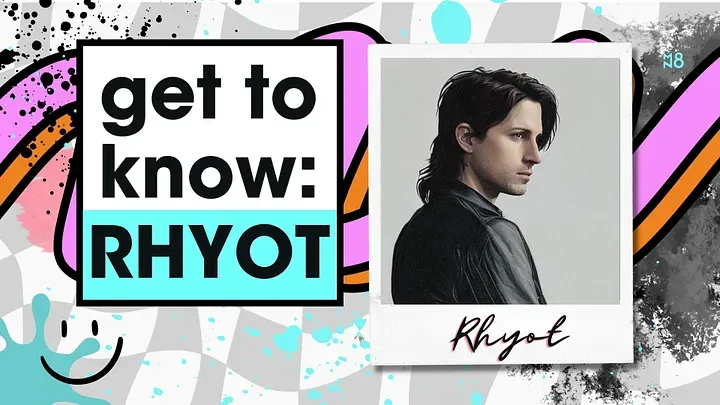
VIA EMANATE LIVE // WRITTEN BY SWARÉ ON DEC 18 2022
After a wicked set in the emanate Discord server over the weekend, we sat down with American-Canadian producer Rhyot to talk music. Bringer of dark dystopian, electro and a production wizard in his own right, Rhyot shared how he get his start in production, what inspires him and handed out some excellent advice on how you can crush it in 2023.
Hey Rhyot! So first off: How did you first get into music production?
Hi emanate! Thanks for having me.
So! I had started DJing events while attending the University of New Hampshire in 2011 through 2014 — fully DIY with PA sound and light rigging, popping up in a number of places around campus and definitely not always to the liking of local police. For the early parts of that I didn’t necessarily have a goal of diving into production, but as time went on and I fell in further with the pursuit I began experimenting.
I had used a few programs in years prior to make short music clips to toss into school video projects, such as Acoustica Beatcraft or Audacity, and had years of video editing experience and familiarity with linear timeline workflows on that front, but hadn’t considered music production as a goal per se. One night over a winter break I saw a contest from mau5trap to submit an original song for a shot at joining the track listing for ‘We Are Friends, Vol. 2’ (yes… two) and that inspired me to ‘find’ my first version of Ableton Live. Of course I didn’t have anything finished to submit by the deadline but there began my epic journey!
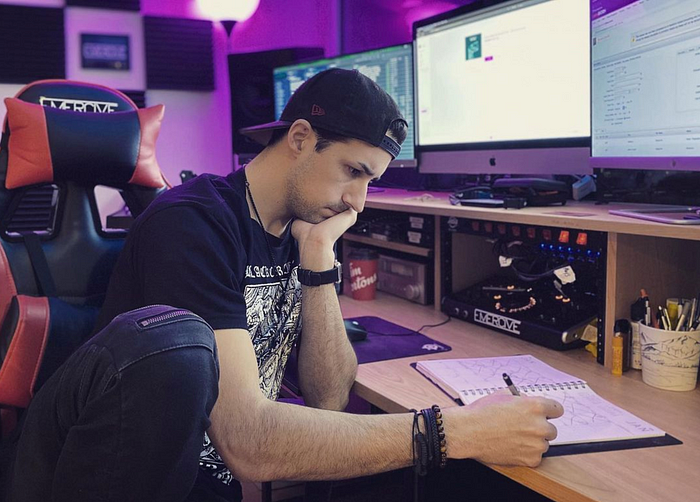
And what drew you to House music?
I wouldn’t call myself an enthusiastic fan of house music, specifically, but I began my listening to electronic music in the early 2000s, which wasn’t a high probability scenario, considering I grew up in rural New England. An older cousin of mine was into dance music and spinning records, which aside from the usual wedding or bowling alley, open format DJ was my first exposure point to performing artistically in the craft. Through childhood into teenage years I found enjoyment in listening to dance compilation albums of my older brother’s, such as the ESPN ‘Jock Jams’ series, or ‘Stadium Anthems’. I’m not going to make up some story about being a deep aficionado and childhood protégé naturally inclined toward electronic music because it wasn’t the case, though cheesy artist origin stories are usually good for a laugh.
Into my high school years I primarily listened to alternative rock, which gave birth to the name ‘Rhyot’ originally for other uses, but that’s a story for another time. Anything short of that would be a few dance records from artists like Alice Deejay, Kylie Minogue, Basshunter, ATB, Prodigy, Darude, etc — stuff that was popular enough to make it to my neck of the woods. I didn’t get too much more into other genres or as seriously until college — enter Deadmau5, Chris Lake, Tim Berg, Tiesto, W&W, Armin, and the ensuing EDM era. Once I started playing out then that drove me to dig for questionable download sites where I would amass huge quantities of various records, and half of the fun was sorting through and weeding out stuff I didn’t like from what I did. As a result, I was discovering artists, genres, curators, and mashing up obscure stuff to play for these college parties of people who maybe walked in expecting top 40 or hip hop all night. I loved the process of introducing people to music they may have otherwise never paid much mind to and driving discovery.
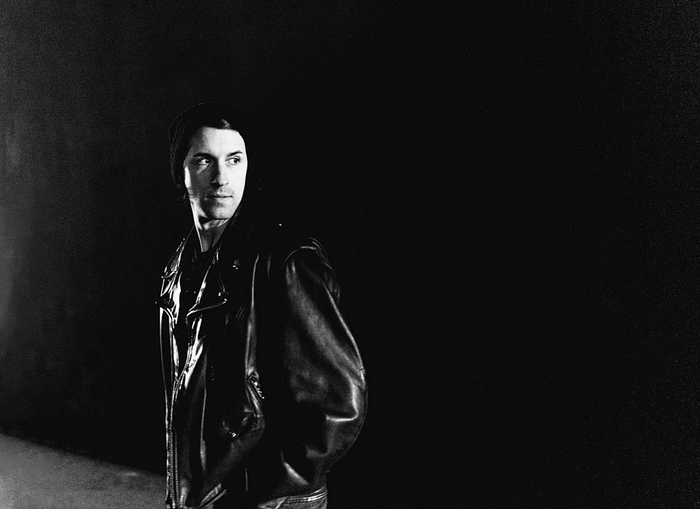
House has a lot of sub genres, where would you say your sound sits?
My sound over recent history is more so rooted in a combination of styles between electro, techno, industrial, and electronica. To elaborate on the last, which I think is super intriguing (personally), specifically in terms of music designed for listening rather than dance clubs, with eclectic creative direction and a range of instruments or source elements. I enjoy getting lost in a record.
In the past there have been some records or projects of mine that are inspired by aspects of progressive house, but I’m a bit apart from that camp as an artist — love it as a listener, however. For the stuff I’m wanting to get out in the near future you could broadly describe the overall setting as dark, cyberpunk, cinematic, and thought provoking.
When you’re writing a new song, where do you begin?
My workflow is rarely the same project to project, and I’m not really someone who always approaches the studio with an intended direction beyond vague ideation. I have an amateur drumming background and have dabbled with guitar in light extent, but far be myself from a trained musician. I tend to find my way through a song once I’m working rather than translating a preconceived melody, theme or progression into the DAW.
I most frequently will begin by templating an arrangement, which is an organisational tool similar to creating outlining tools before approaching a body of written word, be it an article, essay, report, letter, etc. I aim to define an audience and space for the song to be geared toward, eg. for headphones, more for a club floor, and then targeted for myself and a niche audience versus perhaps a more broadly accessible idea. The reason I say that last bit is because don’t often write with consideration for mass appeal, but don’t call me a martyr for it.
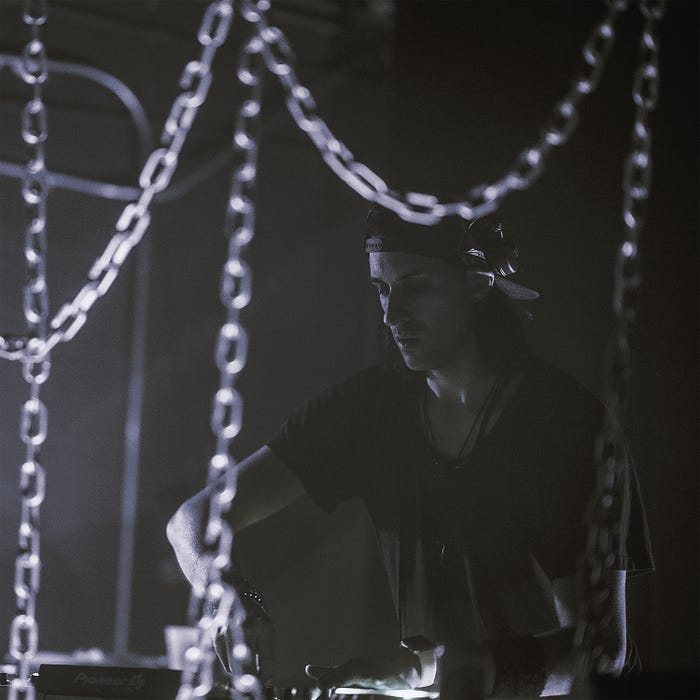
Procedurally, I’ll place timeline markers for phrasing out the arrangement on the timeline, create MIDI tracks with blank clips, titled for the song elements for which they serve as placeholders, and repeat until I have the silhouette of a “complete” track. I have a strong preference to audio vs MIDI except where required (such as soft synths, or sending to hardware), so I’ll drop in samples, build out percussion channels, and delete the placeholders as I go, moving onward to bass leads, synth leads, subs, and finally FX / ornamental components.
I rarely finish a track in a sitting, so my preferred method for tracking WIPs is to bounce out an mp3 clip of the project at the end of a session (or update an old one), stick it into a folder full of these various clips, and then when I intend to have a continuation session rather than approach to launch a new project, I just rifle through those clips until something catches my ear for the day. A recently completed track I’m very excited for followed the continuation process: I heard the clip, thought of a cool idea, reopened, and went from 25%-100% rather quickly. The flow wasn’t there while starting the project, but drove the second session quickly to completion after a month’s pause.
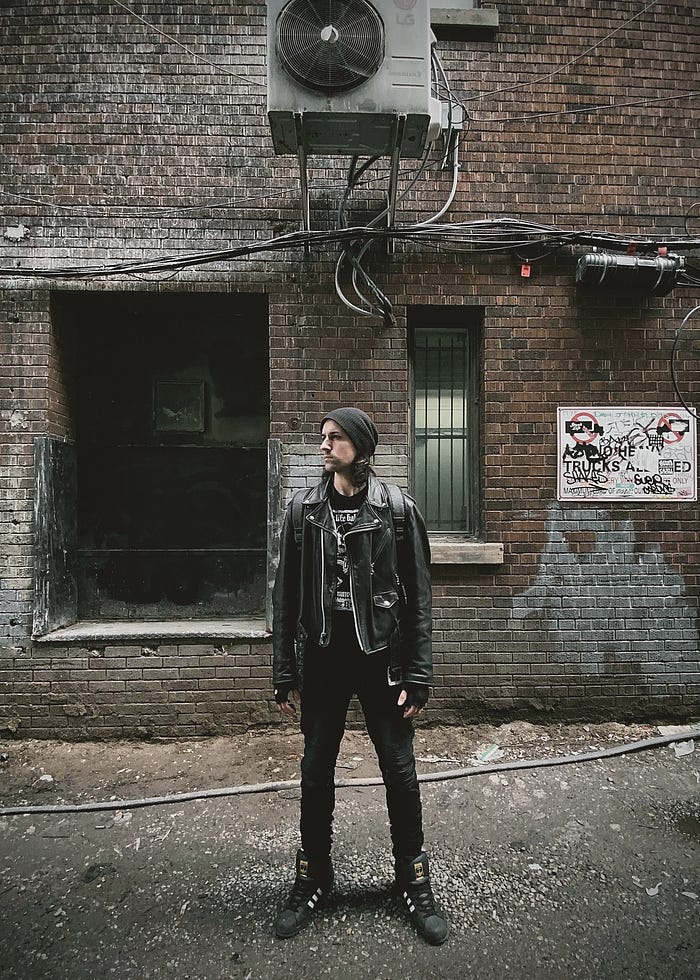
You’re an early adopter of Web3, what interested you the most about it?
I would be lying if I said there wasn’t at least some degree of financial element to this adventure, because frankly, I’m in no position take passive approaches to disruptive opportunity. Do I think I’ll ‘make it big on web3’? No, nor do I want to, but there’s no harm in casting a wide net into the world. My only aim, which encompasses my exploration with web3 is that I strive to have freedom to choose how to spend my time, which when able, tends to be on creative music, art, and/or gaming related projects. Had I dropped ten bucks into Bitcoin when I first heard about it in World of Warcraft /2 Trade Chat in 2008, I wouldn’t have a remaining concern in this area. Without going too deep, I don’t want to spend more time than necessary doing things I don’t enjoy, while time remaining is of unknown quantity, while my consciousness is a one-shot experience, and while things I don’t enjoy means working to live. TL;DR, I’m paying attention because I can’t afford not to. End of TEDx talk.
Back to the question, “Interested the most” I think takes time to discover. The above would best fit my initial dive(s) into web3 topics, but my exploration since 2017–2018 has been mostly motivated by curiosity. I’ve always been among the first people I know to set up profiles on or test out emerging digital platforms, whether they be social media or what have you. This was the same mindset that put me on Myspace in whatever year, Facebook in 2005, Twitter in 2009, YikYak and Instagram in 2013, Pinyata in 2015, Choon in 2018, and then onward to Emanate and co since. I don’t even want to try to come up with a full list — it would be unhealthy almost. Whether that’s just FOMO or ADHD, you take your pick.
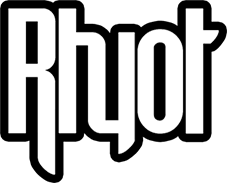
Where do you think music is heading in regards to web3?
Well first, you’ve got to love a good underdog story. I see a massive opportunity for smart contracts to change the way the music industry functions — point blank. Chopping out middle-parties and unnecessary components from artist to listener is absolutely a future rebellion, though at the same time, there has got to be some degree of moderation, which the web1–2 world of the industry excelled at, and when I say that, I don’t necessarily mean it positively.
The longer I’ve been in music and entertainment, often now behind the curtain, the more I’ve recognized what seems, not to say it is, but appears to be, a manufactured pedestal and arms-length separation harbouring non-transparency-by-design between artists and listeners, or even expanded to between “professional” artists and those aspiring. What I mean by that is, there are systems that have historically worked to keep fans and new artists “below” or out of reach of establish acts, or even the industry as a whole. Call this separation “the Gate”, if you will. This creates a superhuman sort of identity to professional acts — they seem untouchable. Yet while those star-quality brand faces may appear to be legendary greats (and in some cases they can be), many are delicately framed through strategically crafted marketing campaigns to obscure view to grocery list sized teams of publicly unrecognized songwriters, performers, etc., or ghost producers as they relate to dance music, the illusion, or idolization, and the star-power of that image ultimately creates fandom, and in-turn helps to generate money for label and management execs. In short, yeah, sure, Band or Singer XYZ may be awesome, but the craze is an artificially catalyzed formula to extract money from the public and split it across the many open palms involved. If you’re an aspiring artist, you’re affected, too. You might write incredible music, but how easy is it to find a direct contact, or even get a word back from someone on the inside? Unless you’re someone whom those players have a personal or professional interest in allowing passage through the gate to their resources, then there you’ll stand, on the outside looking in, just like Eric Andre in that White House fence meme.
Through the rise of smaller aggregators and distributors in music, such as Symphonic, CD Baby, Label Worx, Emanate, even Bandcamp to an extent, the dependency on labels and other industry players for independent artists, and many various platforms have split cracks into the frame of the gate. The potential of web3 to democratize or even in some cases socialize the rights and financial backend of various touch-points in music and entertainment as a whole can further enable creatives to be operational on their own, metaphorically seeping into those cracks, solidifying through the artist’s successes, and then the whole damn gate comes down. When every artist has access to DSPs, to commercial release, to touring — whatever, then the value of control by those former devices becomes less, and the market share of independents will increase. Yey. *Pops a measly tube of confetti open*
How do you think an artist can stand out in this ecosystem?
Less about web3 specifically and broadly speaking… everyone is screaming for attention, all the time. It’s so much… all… the time. Perhaps, might I suggest, to try: just shutting up. As I invoke the energy of Bo Burnham’s ‘Inside’, I don’t mean what I say negatively, but critically. Just put your phone down, go self soothe for a couple of weeks, do some work, shoot off a few emails, make a few connections, take care of yourself, and experiment with shutting up. I’m fully aware that the algorithms will penalize you for not posting everyday — yep, that’s grand. You know what else is penalizing? Mute lists on Twitter. Posting just to post is so fundamentally awful, it’s nearly beyond the reach of comedic tone, but not entirely. I’ve been criticized for this approach to social posting, and frankly, there is not a single person on Earth with grounds to speak on that beyond myself. The effect? I’ll speak for myself in saying that less social media and more raw productivity makes me a happier person capable of doing better work. In addition, I find that my core support base pays attention when I have something worthwhile to share, and most of what I contribute doesn’t require people to pre-filter my digital scrawling between valuable content and pure bullshit noise. There is so much noise all the time. So much so that as of late, I tend to hang out in my studio in total silence if not producing. That’s not even a joke. The hum of my central air system and the clicks of my keyboard and mouse is the ambiance of my productivity. Maybe this is also an ADHD thing, but it’s my honest take.
Oh, P.S., don’t play it safe. Take chances, stick your neck out from time to time. You don’t have to be loud to be noticed, and going against the grain helps.
Are you working on anything new at the moment?
This is about to sound really rise-and-grind cringecore inspobro, but my idea of recreational time is typically work. I do make a point to shut off to watch a show or movie, or play a game, or go for a walk by the lake if the weather’s nice — something just to force a bit of distance and variety into my daily life — but I’m working on something constantly.
Currently alongside my artist project (which I am personally closest to), I am developing a secondary alias (details TBA), I have been running Emercive since late 2017 (which even when dormant gets attention to backend projects), and have been operating Genova Agency since incorporating with Barbosa and Decoder in September of 2022. For Rhyot, I’m in the process of brokering releases of my new music to labels that would build audience and exposure, so as to be more successful in approaching prospective managers and agents, so as to increase success rates in approaching talent buyers and promoters, so as to book and perform more shows across North America and into Europe. For the TBA project, I’m just writing music and exploring sounds at first, as the branding is set up and ready for launch. For Emercive, we just struck a synchronization/licensing deal for placing our music in film/TV/advertisements with a studio in Montréal called Les Studios Octave, owned and operated by our good friend LUNR, and I’m considering a return to some form of a release schedule in 2023 for the label. For Genova, we’ve been booking shows across North America and Europe, and have a few tours in the works for 2023, one of which in particular is going to be notable at the highest levels of the techno genre. That’s about all I can say for now, but I look forward to public announcements!
What do you know now that you wish you knew when you began writing music?
Everything, but at the same time nothing. I haven’t taken on formal schooling or training for this field, though have been fortunate enough to apply a few skills from my degree in communication and a certificate in project management. The independent process of chasing interests and developing understandings rather than learning from single-point sources has however resulted in what I feel is a decently well rounded and polled foundation for me to work from. I do wish in some ways that I was 20 years old again, and could bring all I’ve absorbed back in time to that point, but hey, this is part of the process and decade-plus journey. I’ll never be called an industry plant, that’s for certain.
What advice would you give to an artist just starting out today?
- Be organized, save everything, use cloud storage and redundant backups. Title files appropriately, and create great folder trees.
- Establish goals and check in with yourself on them consistently. Your definition of success will be unique, and may change periodically.
- Educate yourself on both soft and hard skills if you aspire to be more than an introverted musical artist. Nothing is wrong at all with the aforementioned, but if you want to expand audience and borders to develop a multifaceted career from this pursuit, you should look to build your arsenal of capabilities. I can’t recommend project management skills enough.
- Trust your gut, and stick to your values.
- It’s okay to have inspirations and muses, but you have to eventually fly the nest and forge your own path.
- Aim to deliver the most professional results possible for your projects. Admit your weak areas, and improve.
- Cold contact messages and emails are the most valuable practice in building your network.
- Make genuine connections. Don’t social climb, clout chase, mine people for resources, or discard those perceivably ‘below’ your level. Form a group and grow together.
- Music and art are not innately competitive. More artists succeeding = more art = more audience = more opportunity. See above.
- Don’t overthink, don’t under-do.
- Have a product to sell before writing a sales pitch. Spend time on your craft before sweating over marketing. That stuff comes later, though it will eventually become a major area of focus.
- If you don’t enjoy the pursuit in music for what it is while you’re developing, quit. You’re only hurting yourself by dragging it out. Maybe consider industry roles?
Final note just on that last point. There’s a lack of people who aspire to just work on the industry backend, such as management, booking, events, etc., and you would be surprised at the widespread lack of professionalism or accountability of many who are in current roles — yes even high profile ones. No disrespect intended there, but I would strongly encourage that people with acute attention to detail, great collaboration skills, and a passion for the music consider a professional role in the field. These positions grant opportunity to shape the landscape of electronic music in small ways, which can surprisingly quickly mount into larger ones. Support independents, support the underground, and affect positive change into the scene for all to enjoy. The dance community is global, but much smaller than it may seem.
That’s all for now, thank you emanate, thank you friends for reading.
Go check out “Genesis” (the extended mix is best) — available everywhere 12/16!
Take care, have a good holiday season, put on a mask if your crazy relative starts coughing all over the house, and I’ll see you in 2023!
Well that’s all folks! Big thank you to Rhyot for taking the time to have such a great chat with us.
Source: https://medium.com/emanate-live/get-to-know-rhyot-ebbf01baa529

